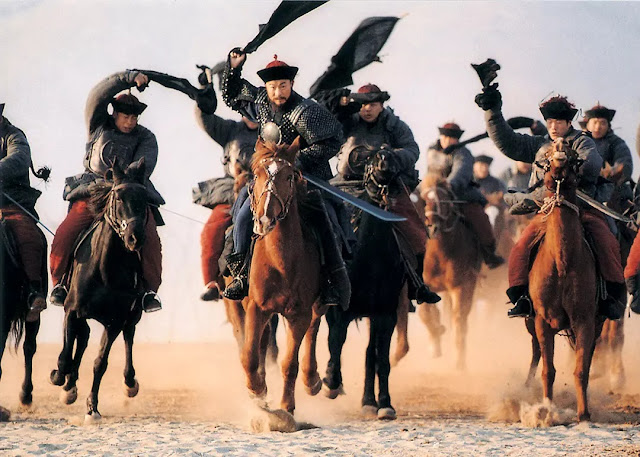It may sound implausible to many, but at one point in history, China nearly became a pious Christian kingdom. Sort of. This is the story of Taiping Heavenly Kingdom, a rebellious state in Southern China that tried to overthrow the Chinese Emperor in Beijing.
 |
| A scene from The Warlords (2007), a movie based on Taiping Rebellion |
The story began in 19th century, when China under the Qing dynasty was plagued by poverty, famine, and extreme inequality. Farmers were burdened with heavy taxes, and the rule of law deteriorated as banditry and piracy became widespread following imperial military's defeat in the First Opium War.
In this uncertain social landscape, Protestant missionaries from the West such as Robert Morrison came to preach the Gospel verses to local people in Guangdong and Southern China. They baptized new converts, who then wrote and printed religious books in local language. One of these books, titled Quanshi Liangyan (Good Words to Admonish the Age) arrived at the hand of Hong Xiuquan, a Hakka minority teacher who was desperate after his fourth attempt to pass the imperial civil service examination had been unsuccessful.
Hong claimed that he had a dream about his celestial family in heaven, including Heavenly Father and Elder Brother. After reading Quanshi Liangyan, he identified them with Christian God the Father and Jesus Christ. Guess what happened next? Hong declared himself as the son of God and younger brother of Jesus. And so his first mission began to convert the whole China.
After destroying Buddha's statues and Confucian books in his house, Hong started preaching the new religion to his neighbors and relatives. It wasn't an easy task, but Hong didn't lose faith and kept spreading his version of Christianity. Slowly but sure, his followers grew in size. From two-three people at the beginning, to dozens, to hundreds, to thousands in a couple years. They formed a secret cult called Bai Shangdi Hui (God Worshipping Society).
In 1847, Hong translated the Bible and presented Christianity to his followers as the original religion of China, long before it's poisoned by Confucianism. The Bible inspired him to launch a political movement that would make the Qing dynasty tremble, especially the Old Testament chapters where God punished the evil nations and rewarded the good ones.
By 1851, Hong Xiuquan had gathered some 10,000 militarized followers and declared himself to be the Heavenly King. After the first uprising in Jintian, Hong's army quickly gained support from anti-Qing locals. Only in two years, the Heavenly Army managed to take Nanjing, one of China's most prestigious imperial cities, from the Qing dynasty. They renamed it as Tianjing (Heavenly Capital) and made it their new capital.
Hong's vision was ambitious. He planned to expand the border of his kingdom even further and set his eyes on Beijing. One by one, the neighboring cities fell into his grasp. It's only after the Battle of Shanghai that the Heavenly Army's good fortune began to wane.
With the help of European commanders, the imperial Qing army eventually managed to push back the rebels. In 1864, Nanjing was taken over once again by the imperial army. Hong died during the siege and his heir couldn't defend the city. This marked the end of Taiping Heavenly Kingdom.
It is estimated that at least 20-30 million people died during the Taiping Rebellion, making it the bloodiest civil war in human history. It is so bloody that the death toll is comparable, if not higher, with that of World War I. Both the Taiping army and the imperial Qing army were recorded to commit massacres and brutal executions throughout the chaotic years, leaving ravaged cities and villages.
Many historians saw the Taiping Heavenly Kingdom created by Hong as a form of class struggle. The Heavenly Army consisted of mostly poor miners and peasants from ethnic minority Hakka, Cantonese, and Zhuang. The kingdom is often regarded as a proto-communist state. It abolished private property ownership, limited private trade, and introduced several progressive reforms such as banning foot-binding tradition for girls and allowing women to take civil service examination for the first time. Their other controversial policies include extreme gender segregation, prohibition of alcohol, gambling, opium, tobacco, polygamy, and sex work.
Taiping Heavenly Kingdom was also a highly theocratic entity. Many Buddhist, Daoist, and Confucian libraries were destroyed while their temples were converted into churches and schools, since the old religions were viewed as part of the oppressive evil power. They also changed the subject of study for civil service examination from Confucian Classics to the Bible.
And that is the story about how China almost become a Christian empire. Sort of.


.png)
.png)


0 Comments